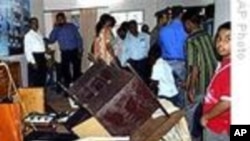Religious violence is a growing problem in parts of India. According to the International Religious Freedom Report for 2008, there were organized communal attacks against minority religious groups, particularly in states governed by the Hindu nationalist Bharatiya Janata Party, or BJP.
In the state of Orissa, governed by a coalition government that includes the BJP, Hindu extremists attacked Christian villagers and churches in the Kandhamal district over the Christmas holiday. Approximately, 100 churches and Christian institutions were damaged, and 700 Christian homes were destroyed causing villagers to flee to nearby forests.
More violence followed in August after the murder of a prominent Hindu priest. Allegedly led by a militant youth wing of the Hindu nationalist Vishnu Hindu Parishad group, mobs torched churches and homes, displacing tens of thousands of Christians, many of whom are still in camps.
Since then, anti-Christian attacks have spread in the central state of Madhya Pradesh, Karnataka and Kerala in the south, and to Uttar Pradesh in the north. Some of the worst cases have occurred in Karnataka, which earlier this year voted in the Hindu nationalist party, BJP. U.S. Ambassador at Large for International Religious Freedom John Hanford said the violence appeared to be politically motivated, especially since some of it was carried out by police.
Unfortunately, convictions over religious violence in India are rare. Last March, a United Nations freedom-of-religion Special Rapporteur warned that the scarcity of prosecutions and “political exploitation of communal tensions” put India at risk for more violence.
The persecution of Christians in India tarnishes the long history of peaceful coexistence between Christians and Hindus. The U.S., said Ambassador Hanford, urges “all parties to refrain from violence and urge[s] government officials to protect religious freedom throughout India and thus, preserve India’s long-standing tradition of religious tolerance.”
In the state of Orissa, governed by a coalition government that includes the BJP, Hindu extremists attacked Christian villagers and churches in the Kandhamal district over the Christmas holiday. Approximately, 100 churches and Christian institutions were damaged, and 700 Christian homes were destroyed causing villagers to flee to nearby forests.
More violence followed in August after the murder of a prominent Hindu priest. Allegedly led by a militant youth wing of the Hindu nationalist Vishnu Hindu Parishad group, mobs torched churches and homes, displacing tens of thousands of Christians, many of whom are still in camps.
Since then, anti-Christian attacks have spread in the central state of Madhya Pradesh, Karnataka and Kerala in the south, and to Uttar Pradesh in the north. Some of the worst cases have occurred in Karnataka, which earlier this year voted in the Hindu nationalist party, BJP. U.S. Ambassador at Large for International Religious Freedom John Hanford said the violence appeared to be politically motivated, especially since some of it was carried out by police.
Unfortunately, convictions over religious violence in India are rare. Last March, a United Nations freedom-of-religion Special Rapporteur warned that the scarcity of prosecutions and “political exploitation of communal tensions” put India at risk for more violence.
The persecution of Christians in India tarnishes the long history of peaceful coexistence between Christians and Hindus. The U.S., said Ambassador Hanford, urges “all parties to refrain from violence and urge[s] government officials to protect religious freedom throughout India and thus, preserve India’s long-standing tradition of religious tolerance.”




